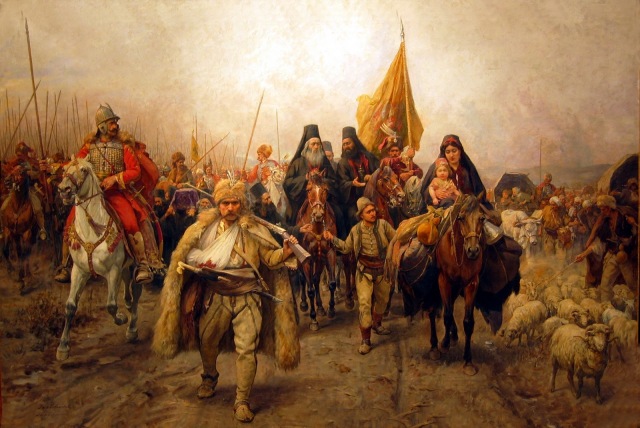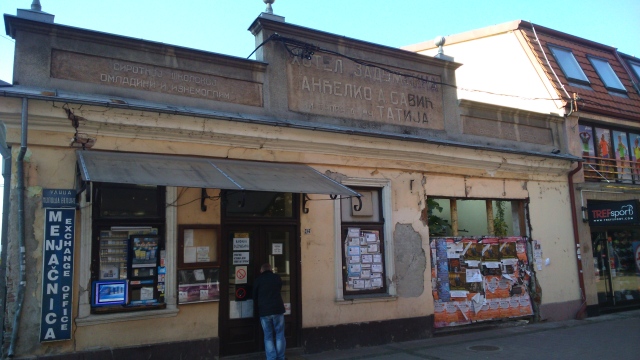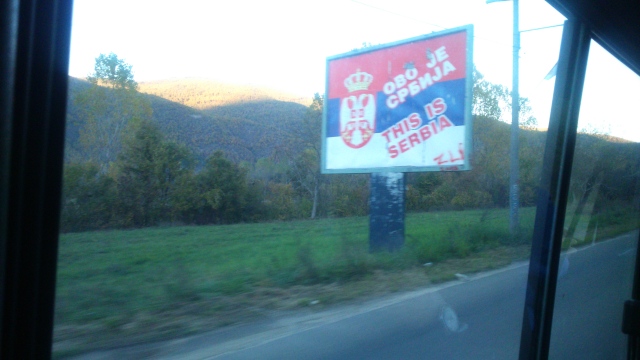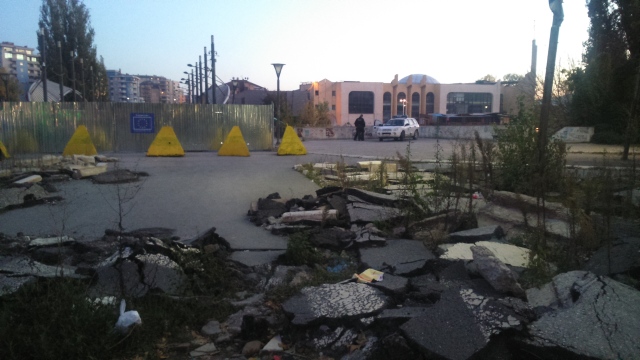Why?
The story is inspired by my hitchhiking trip to Kosovo, the Serb Holy Land. It is based on true events, the participants of these events, my personal impressions and perceptions. Although it seemed like a dream few times, all the characters are realistic and they are indicated by their proper names. One of the characters is indicated as the Christ.
I’ve always felt a special connection with Kosovo. Like the majority of Serbs anyway. As a Bosnian citizen I have not been able to visit that place without a visa, so three years earlier I entered a process of getting a passport and citizenship of the Republic of Serbia. Also, with that passport I could go to Israel without a visa, which I had equally strong desire to see since my earliest childhood.
Understand
Bosnia did not recognize Kosovo* as a state, because of the Bosnian Serbs. Serbs are one of 3 constitutional nations in Bosnia. All 3 nations have to agree about important things (like recognizing a country). It is very complicated political system. Of course, no Serb would ever recognize Kosovo as an independent state. For them, Kosovo is and will always be the very heart and soul of Serbia.
That’s why Kosovo* also does not let Bosnian citizens without a visa in, even though majority of people in Bosnia are Muslims, and even though Kosovo* has relatively good relations with Bosnia and a lot of issues with Serbia. One of the Balkan’s paradoxes. People with Serbia’s passport can go there freely. Half of the world considers Kosovo still as a part of Serbia, half of it sees it as an independent state. So, technically, Kosovo is still part of Serbia, according to some. That’s why people with Serbia’s citizenship and passport do not need a visa to enter Kosovo.
Kosovo takes a central part in Serb identity and history. That is the most important place for Serbs on the Earth. A famous Kosovo battle in 1389, in which Serbs were defending Serbia and after all – Europe from Ottoman invasion, was held there, just near the capital Priština. Even though Serbian army was much smaller and they technically lost the battle, a Serb hero Miloš Obilić managed to kill Sultan and Serbs slowed Turks down a lot, causing them many casualties and forcing them to withdraw and regroup. Serbs see it as a win. Not just a battle win, it’s a spiritual win for Serbs. Serbs knew they would all die but they decided to sacrifice themselves and not to surrender. To fight for heavenly kingdom.
This part of the world is known as Old Serbia. There are over 1100 orthodox monasteries and churches built by Serbian rulers during centuries in Kosovo. Most of them are destroyed today. Majority was destroyed during and after NATO aggression against Serbia in 1999, even though most of them are 500, 600 or 700+ years old.
Serbs were living there since forever, as big majority. Albanians also, as minority. Until now. There is just few Serbs left in Kosovo today. More and more Serbs leave Kosovo every year, every day is more and more dangerous and hard for them to live there. They were leaving it for 500 years for many reasons such as violence, poverty and seeking for better life on the northern, more developed area. On the other hand, Kosovo was always the north for Albanians so it was natural for them to start coming every year more and more, slowly forcing Serbs to leave. Albanian population was rising very fast with a lot of them coming to Kosovo year after year and their high birthrate, the highest in Europe. That’s why since the 19th century, Serbs were not majority in Kosovo.

There are written testimonies in Serb monasteries from 14 and 15th century about Albanian small troops entering monastery land, stealing and burning their property.
Leaving my safe zone
I said no one where am I going. I just left. Even my parents did not know. I didn’t want them to worry. People here think that Kosovo is very dangerous place. More dangerous than it really is. People are scared. Almost no Serb goes there. Especially alone. It is very hard and complicated to be a Serb in Kosovo today.
I needed to see it for myself. I needed to understand Kosovo. I did not want to listen to propaganda in media anymore. I just had to go there. After all, I decided that nothing bad can happen to me.
I went to Sarajevo by bus, and the next day I started hitchhiking from there.
In the bus I met Sara. Sara lives in Sarajevo, a parallel universe. She was born as Macedonian, but she considers herself to be a Bosniak, a Muslim woman. Her brother is Eskimo, the other one is a Serb. At least they said so on the census.
Sarajevo is nice, I love to come there, even though it is a part of another entity, and many people do not like to go there from Banjaluka (and vice versa). My friend Eli was told not to come to Banjaluka from Sarajevo because crazy sick violent Serbs live there. She could hear something similar from some people in Banjaluka about Sarajevo people. Of course, it’s just a crap. I feel comfortable with my name and identity in Sarajevo.
I saw pictures of people welcoming Bosnian football team returning from big competitions. Unbelievable. 10-20000 people are celebrating on the streets. It is incredible that I (and probably most people in the Republic of Srpska) have no idea what’s going on in Sarajevo. Cheering for the BH team!? Weird. We cheer for Serbia, as i know. But, what do I know about cheering and sports anyway.
The next day I got up early, ate ćevapi on Baščaršija and left. It was a nice November morning.
Sanel was the first guy I managed to stop. A nice story for morning. Sanel is an ex prisoner, he was beating people and stealing stuff from them. There are also some serious crimes in his biography. Sanel is a Serb. He told me he knew criminals from my town. Great, I thought, now I’m relieved. A 50-year-old bad boy from Sarajevo. I was thinking, is this real!? A Serb guy, “our” guy, at the beginning of my journey is just about to kill me, take my money, my kidneys. On such a beautiful day, such a wonderful morning. I do not accept to die on a day like this.
Of course, nothing bad happened, Sanel left me at the Pale – Višegrad crossroads, with the conclusion that I have to get myself a good old rich lady, a foreigner maybe. He maintains one elderly lady, from Slovenia. Happy and satisfied, with my two kidneys, I continued.
The next man that I stopped was Siniša, a police officer from Banja Luka. He took me to Rogatica. It’s St. Luka today. His uncle celebrates this day, so he’s visiting him. A nice guy.
In Rogatica, where I hitchhiked, the boy with some sort of mental disability appeared. Vladimir. Student, traveling home to Višegrad. An experienced hitchhiker. He travels like that all the time. Together we stopped an older man from Rogatica. A funny guy. He took us to a crossroads to Foča. There we stopped the guy, trucker, from Aleksandrovac, Serbia. Vladimir let me an advantage and I left with the trucker, leaving Vladimir alone on the road.
A huge truck driving man was talking very loud, eating candies and offering me some during the whole trip. He was generating an enormous amount of trash and throwing it out of the window. He was throwing boxes of biscuits, bags of candies, boxes of cigarettes. Part of me died. I have not seen that for a long time. Terrible. You can not see that in my town. He contaminated more nature for that hour than the average man does for life.
Christ
We stopped at the entrance to Serbia, the trucker had to make a 45 minutes break. I went to a passport check and as soon as I passed, a little, old car stopped. I have not even hitchhiked it. Inside – the Christ, personally. Saving me. I’m going in. I was not sure whether the Odin took the figure of Christ to look after me, or it was the Christ himself or Nenad, a guy from a village near the border. I could smell the incense in the car. He spoke quietly, calming me down with his voice. 33 years old (!?). We passed by the church and he crossed himself. Nenad is a cook, working in a restaurant on the famous Šargan eight.
Until that moment I only told my friend Sara where I was going. I told him also. He says he wanted to visit Kosovo more than anything, but there was no one to watch his cattle. He also wanted to see Hilandar, oldest Serbian monastery, on Athos, Holy Mountain in Greece, but he could not leave the cattle. One monk offered to watch his cows so he can go pray in Hilandar and worship it. He said he would have gone with me now if he only could. It’s a right thing to do, God will give you strength to reach your goal, you’ll get there safely, he said. He left me in Užice. I asked him for a contact, so I can find him on the Internet. He said he didn’t have Internet, Facebook, didn’t use it. He left. And returned after few seconds. Opened his wallet and gave me a small icon he was carrying with him for years. The Holy Mother of God from Jerusalem. He left me standing on the street in the middle of Užice, completely touched, impressed and speachless.
The Chetniks
I hitched a few more cars to a crossroad to Guča, the middle of nowhere. Then I started walking. I walked with a huge bag on my back for a 2 – 3km trying to stop someone.
I felt great. It’s a nice day. My journey had just begun, hitchhiking through Šumadija, central Serbia region, unconditionally free. Having feeling of enormous freedom and safety. Not my homeland, but my people all around me, everywhere. Just like in Bosnia, in whole Balkans, people are extremely hospitable and nice. There’s no much feeling like hitchhiking through Šumadija for a random Serb guy from Bosnia – feeling like home. I love to travel. I love to travel alone. I can think about anything, solve my own stuff in my head, reconnect. With myself.
Then I stopped two guys. From Ravna Gora, homeland of Chetniks, a Serb king’s army from WW2. Two older guys, introduced themselves to me as Chetniks, Serb nationalists, but without beards. From Kostunica village. Stanko claims to have 200 years. I believe him. They talk about the famous residents of the region. Momcilo Perisic and Vojislav Kostunica, ex Serbian president. They are very proud of themselves and their country. They drove me to Preljina. I always stuck in this Preljina place somehow.
Kraljevo
A guy named Dušan picked me up in Preljine and took me to Mrčajevac. Miroslav Ilic. That’s all I could think of. And nightingales. Weird, i know. Never mind, it’s a Balkan thing.
From there I caught the bus to Kraljevo. I spend my first euro from Sarajevo for transportation. I ate and waited for Vojkan in the place where the time has lost the battle. Hotel Zadužbina.

I wrote to Vojkan while on the road. I found him in the community of people like me. People who offer accommodation in their towns, to passengers and passersby. I had no plan, on the road I decided to sleep in Kraljevo. He invited me to his place.
Great guy. He has few bands, and just tonight he organizes the festival and plays with one of those bands. He gave me the whole house just for me. An empty house. To a complete stranger. He went to the gig and after an hour I also arrived to Rokenrola. A good place, in my taste. Cool bands from Serbia played. I met a lot of young people, drank and hanged out with them. They invited me to their table. At the end of the evening, it came to a clash of local kids, fighting and pulling the knives so they closed the club. Someone yelled my name. I turned and recognized her. Marina. We met in Vrnjacka Banja on a LoveFest a few months earlier. Extraordinary coincidence. Coincidences are a sign that we are on the right track.
The next day I got up early with hangover and headache. Damn. I walked out of the town. After a few kilometers I arrived to a crossroads: Belgrade – Kosovska Mitrovica. Having doubts. Last chance to quit. Left or right !? Left, this time..
Saša
Van stops. I’m going in. The driver looks like an Albanian. Talks like an Albanian. But he listens to Serbs patriot songs. Saša, guy from Belgrade, born in Montenegro, a Serb. A nice man. He told me that Serbs are not welcome in Cetinje, Montenegro. He told me that a nun was kicked out from the restaurant because she was a Serb nun. Then 15 giant Serb men came to that restaurant. They ate, drank, did not pay the bill and demolished the restaurant. It’s not working anymore. Crazy Balkans.
The Brothers
A car with two guys stops. They go to the city center, they said. Fahrudin and his younger brother. Nice local Muslim guys, with the great vibe. They invited me to a cup of coffee in town. I agreed, of course. I’ve never been in Novi Pazar. The younger, 18 year old brother go to Madrasah. He will be a Hodja, imam. He was telling me interesting stuff about his school. The older brother, Fahrudin, tells me about Muhammad. Every time he mentions his name, he says that phrase in Arabic. alayhi wa-alehe wa-sallam (peace be upon him). He explained the phrase and answered me a bunch of questions that I had for him, about Islam and it’s traditions. Fantastic story. I learned a lot from this brilliant man. They didn’t let me pay. You’re our guest.
We walked around the city, talking and discussing politics and religion. We did not agree on all the details, but that was the richness of this meeting. They took me to their place, just near the road and offered me lunch with their family. I kindly thanked them, said goodbye and left. They already did too much for me. The hospitality of the Balkan man can not be found anywhere I was, and i traveled a lot. There is a hope…
I’m getting close to Kosovo. I can feel it. This area is full of Muslims. Almost no Serbs and orthodox people here, even though it is in the middle of Serbia. Only a few guidelines for monasteries in Kosovo. Islam is absolutely present. It makes this region even more interesting.

Alija
The van with two young men inside stopped. They invited me in even though there was almost no place for them. Alija and his friend. From some village near Tutin. Fun, 20 years old Muslim guys. They would take me to Ribarići, after they pick up some stuff and a kid from their village. We arrived to the village and Alija introduced me to neighbors, passers-by and an his mother. He introduced me as his friend. Mother made a lunch, and Alija insisted that I eat, and take some water. We waited for a little Karim, a nice 10 year old kid to get ready and we left. Alija is his midgo. I had no idea what it was so little kid explained, surprised how can I not know that word. (Common Turkish expression for an uncle) Somehow four of us managed to get in the van while Alija sat in the back with some stuff, leaving a comfortable seat for me. He left me in Ribarići, saying sorry for not taking me to the entrance to Kosovo. He left the impression of a truly great man.
The bridge
I’m waiting in Ribarići. The middle of nowhere. No one goes that way. Nobody ever passed this way, I thought. There is only 10 km to Kosovo. Excitement is growing. After 45 minutes of waiting, a man stopped. Nedeljko Vuckovic, a handball coach. He played for the former Yugoslavia. Probably I should know who he is.
He travels to Zubin Potok, to train a crew down there, to help the brothers. We passed near the Gazivoda lake around which Belgrade and Pristina were negotiating those days. It’s huge and wonderful. We arrived to the border, which is not actually a border. Kosovo* is not a real state. Confusing. I had a feeling that I could pass without any document, even though officially is impossible to enter with Bosnian passport without a visa. Some people say that they reject you and then show you the illegal way in, and wish you a luck. I started to feel some kind of panic. It’s getting dark, I have no idea where am I going, where will I sleep and what’s happening, in general. That’s it, I’m going in, there’s no way back now, too late to change my mind now. They gave me my passport back. No signs of Kosovo inside, no seals. We’re in. Nedeljko leaves me in Zubin Potok. It’s getting dark slowly.

Standing and waiting on the road again. Cars pass, mostly without licence plates. In northern part of Kosovo, where most of the Serbs live is like that. They are in some kind of a gap there. They do not care about Kosovo* Republic. They do not respect new Republic. Republic of Serbia hardly cares for them. Or, at least, it can not help them anymore. They are on their own. A guy named Milan with an old car, also without plates, picked me up and took me 300 meters to a bus/van station. From there I took a van to Kosovska Mitrovica. I payed 1 euro. It’s the second euro I spent from Sarajevo. Yes, I’ve spent two euros from Sarajevo to Kosovska Mitrovica.
Billboards alongside the road saying this is Serbia, Serbian flags, slogans, graffiti, Serbian language. A total Serbia. I arrived to Mitrovica and walked aimlessly. Unbelievable. I have finally arrived. I got to the bridge. The bridge. Bridge dividing Mitrovica in two parts: Serbian and Albanian part. Bridge dividing the whole Kosovo actually. And it’s a small bridge, some 30 meters long. When you cross it, you immediately enter Albanian, strange world. People look different, they use completely different language, have completely different culture and tradition. Culture and tradition that average Serb know nothing about.

A big pile of remains of asphalt that served as barricades set by the Serbs to prevent the penetration of Albanians still stands on the Serbian part of the bridge. It’s still there. You can cross the bridge only as a pedestrian. Next to the bridge proudly and defiantly stands a monument to the victims of the KLA (Kosovo Liberation Army) and NATO aggression. The bridge is currently under renovation, which further contributes to the impression of horror.


The police stands on the bridge 24/7. I approached them and started a conversation. Mixed police, always a Serb and an Albanian couple, nice people. They said it is not that bad situation. The most troubles cause people who come from other places like Serbs from Banjaluka, Belgrade or Albanians from the south, provoke, make tensions and then leave. And they have to stay there and deal with all of that. To live in all that chaos. Both Serbs and Albanians.
I could feel the fear, tension, sadness and pressure all around. The bridge transmits a terrible energy. Very few people cross it (especially Serbs do not), the city is absolutely divided.
Nobody smiles.
Nobody.
Besides Sanela…
[fblike]




You firend “Dza” has a small comment Chetnics have roots in beginning of 20 century
I approve 🙂
“Sanel” is a Muslim name, though. Not Serbian. Plus the fact that he lives in Sarajevo and stopped right at the separation line to the RS, points to him being Muslim.
Can you name one historical Serb with the name “Sanel” or any Serb athlete, politician, etc. with that name?
Yeah, sure, i see your point. But he told me so, he told me he was on a Serb side during the war, too. I was also surprised.
Maybe he was joking with you. The Muslims in the northwest, I think Velika Kladusa (sp?) who were followers of Fikret Abdic (who actually received the most votes in the Bosnian Presidential election for the war, but, in some kind of agreement with Alija Izetbegovic, agreed to step aside), were allied to Serbs. They finally fell to the (Sarajevo) Government forces after the Serbs were attacked in the Krajina during Operation Storm (which carried into Bosnia).
Also, a former SFOR officer, who was stationed in BiH, just after the war, told me that Muslims south of Brcko were allied with Serbs throughout the entire war too.
He also told me that Croatia had soldiers still stationed there (in the Brcko area) months after the war, in violation to the Dayton Accords.